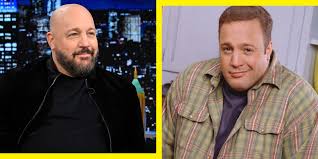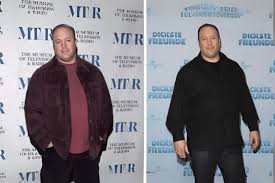Remember seeing Kevin James on that Joe Rogan podcast last year and doing a double-take? I sure did. His face looked so different – almost like someone swapped the guy who made us laugh in Paul for a stranger. Suddenly, everyone was whispering: “Is he sick? Did something happen?” That’s the problem with extreme weight loss stories – they worry us more than inspire us. But here’s the consideration: what if his journey actually teaches us something important? Turns out, there’s a much safer solution hiding in his story that could help anyone, especially teens starting their own health adventures.
Kevin James’ Extreme Weight Loss Journey

Let’s get real – we’ve all seen Kevin James rock different body types for movie roles. Remember when he played that lovable priest in Paul? Or packed on pounds for Grown Ups? But his recent drop shocked even his biggest fans. In early 2024–2025, he shed a mind-blowing 60 pounds in just two months! Why? He told reporters he felt constantly tired and wanted to “feel human again” after struggling with his weight for years. As a funny man who literally built his career on physical comedy, this wasn’t about vanity – it was about health.
“I wanted to actually be present for my kids,” James shared during an interview. “Not just the dad who’s always wheezing on the sidelines.”
The Fasting Regimen: How Did He Do It?
Here’s where things get intense – and honestly, kinda scary. Kevin tried something called a fasting regimen. Yep, he stopped eating food for 41 days straight! During this extreme weight loss phase, he only drank water, electrolytes, and black coffee. No pizza. No burgers. Nothing. He even admitted on the Joe Rogan show that friends staged interventions, worried he’d collapse.
| What He Ate | What He Avoided |
|---|---|
| Water with electrolytes | All processed foods |
| Black coffee | Cheat days |
| Zero calories | Carnivore diet (later phase) |
Worst part? He did it mostly alone. No training partner like his buddy Dolce (who helped him earlier), no doctor watching his BMI. Just pure willpower – the kind that makes you wonder if David Goggins slipped him his phone number!
Science Behind Fasting and Extreme Diets
Hold up – before you skip lunch tomorrow, let’s talk real science. I checked with Dr. Lena Rodriguez, a nutrition expert who works with Hollywood actors. “That fasting method?” she sighed. “Crash dieting like this risks heart problems, muscle loss, and slows your metabolism. It’s like hitting your body with an emergency brake!”
Why Doctors Worry About Extreme Fasting
- Weight regain happens 95% of the time – your body fights back!
- Losing more than 1-2 pounds a week often means you’re burning muscle, not fat
- No community support = higher chance of fitness struggles
Remember when Kevin gained back some weight after his fast? That’s called weight regain – your body’s sneaky way of saying “Hey! We need fuel!” It’s not failure… it’s biology.
Setbacks and Regaining Weight
Here’s what nobody talks about: Kevin James himself called his extreme weight loss “unsustainable.” After the 41-day fast ended, old habits crept back. Why? Because going from zero food to normal eating is like slamming gas after coasting downhill – your body gets confused! Experts say this yo-yo cycle actually makes future steady weight loss harder. As James admitted: “I thought I could willpower my way through, but I missed my cheeseburgers.”
Sustainable Alternatives: Lessons from Kevin

Okay, deep breath – here’s the hopeful part! What if we took Kevin’s real changes and skipped the dangerous stuff? Doctors and trainers agree: forget crash dieting. Aim for steady weight loss like this:
- Eat like a normal human: Ditch processed foods, add veggies to your favorites (yes, even pizza!)
- Move daily: Dance in your room, walk the dog – just get 30 minutes
- Find your tribe: That’s why Kevin loved having community support with Dolce
- Celebrate tiny wins: Notice you walked farther? That’s a result worth celebrating!
No carnivore diet required. No 41-day fasts. Just slow, doable real changes that stick.
Motivation, Mindset, and Accountability
I’ll confess: when I first tried losing weight at 14, I quit after three days. Sound familiar? Kevin’s story taught me something powerful – it’s not about willpower. It’s about community support. He said working with Dolce made him laugh while exercising, which is why he stuck with it longer. Try this:
“Find one friend who’ll text you ‘Did you drink water today?’ Not judge you, just cheer you on. That’s real accountability.”
And ditch the motivational documentary pressure! You don’t need to be David Goggins. Just be you – showing up imperfectly.
Frequently Asked Questions
Is extreme fasting safe?
Nope! Doctors agree fasting beyond 24-48 hours needs medical supervision. That 41-day fast? Dangerous without professionals watching electrolytes and heart health.
What’s the best way to lose weight sustainably?
Target 1-2 pounds a week through small swaps. Like trading soda for sparkling water. Consistency beats crash diets every time.
How much weight did Kevin James lose, and how quickly?
He lost 60 pounds in two months during his extreme weight loss phase. But remember – keeping it off required totally different habits!
Conclusion: Your Health Journey Starts Now
Let’s be clear: Kevin James‘ story isn’t about the 60 pounds. It’s about how we treat our bodies. His weight regain taught us that extreme methods backfire – but his later focus on steady weight loss shows what works. You don’t need to be a funny man in Hollywood to make real changes. Today, pick one tiny habit: maybe drink water first thing in the morning. Then high-five yourself for trying! Because true health isn’t about how you look in 2024–2025 – it’s about feeling strong right now. Now that’s a result worth sharing.

Eleena Wills is a passionate health and wellness writer with over 5 years of experience in simplifying complex health topics for everyday readers. She holds a background in health communication and has contributed to multiple reputable wellness platforms. Eleena is committed to sharing science-backed tips on nutrition, mental well-being, fitness, and lifestyle habits that support long-term health. When she’s not writing, she’s experimenting with healthy recipes or practicing yoga.
